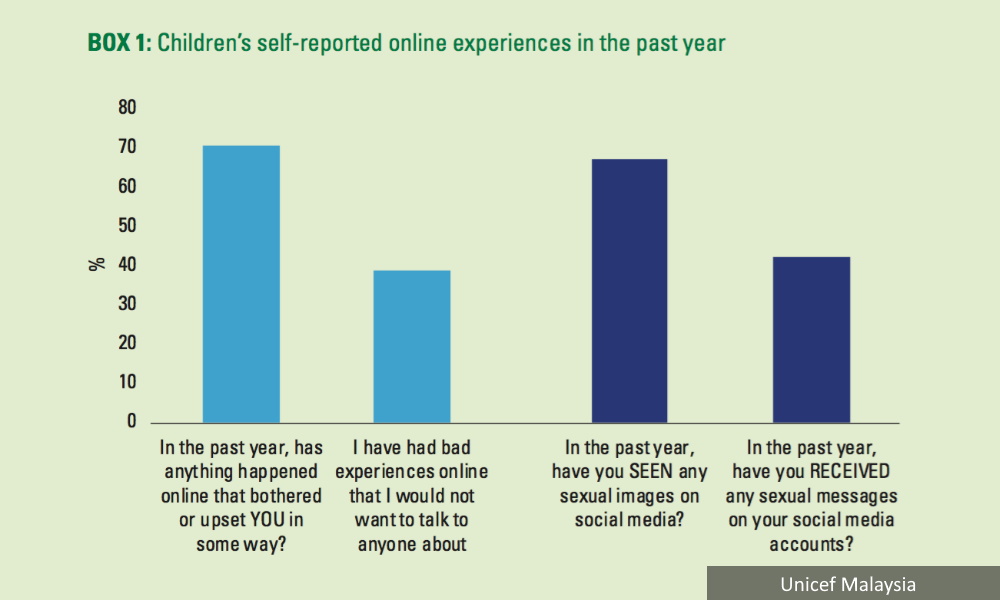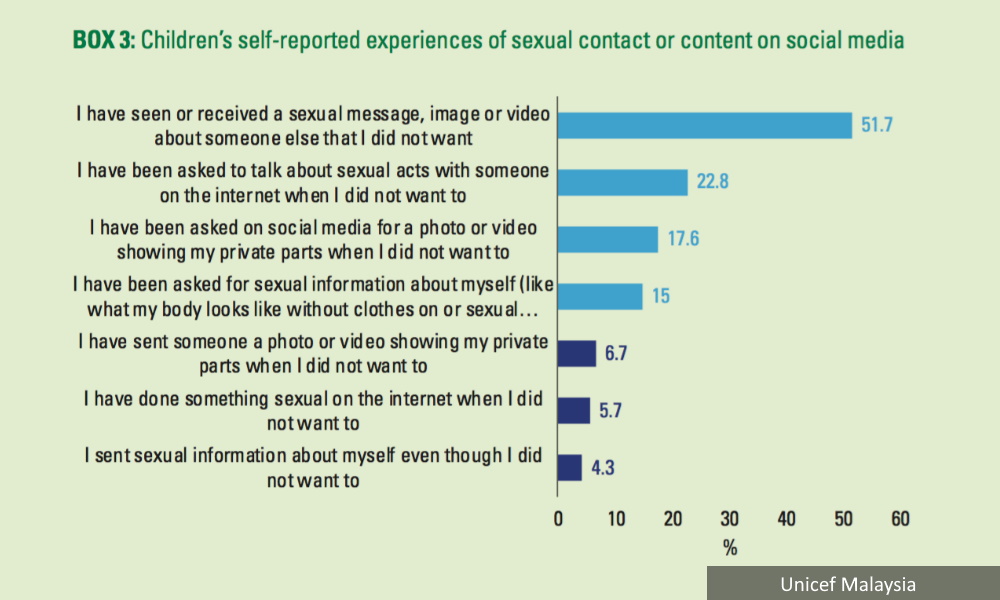
Some 70 percent of children in a recent Unicef study reported having negative online experiences over the past year with more than 65 percent saying they had seen sexual images on social media.
In the same study, about 40 percent said they had received unwanted sexual messages on their social media accounts.
Titled “Our Lives Online - Use of Social Media by Children and Adolescents in East Asia”, the 2019 study looked at social media use of 301 children aged between 11 and 18 from Malaysia, Indonesia, Cambodia and Thailand.
Special focus was placed on marginalised communities, with 121 of respondents classified as “street children and refugees”.
Launched today, the study report noted minimal differences between boys and girls when asked to self-report to researchers any online experiences that bothered or upset them.

“Many of the children had also received unsolicited images from men online, from both boys of a similar age and from strangers that they may or may not have met online.
“While this was more common amongst the girls, many boys recounted also being sent pictures unsolicited or being asked for pictures of themselves.
“Most commonly, children tended not to know the person who was approaching them for images. Being sent images, or having images requested, was also often accompanied by requests to chat,” it said.
The study noted 22.8 percent of children said they had been asked to engage in unwanted sexually explicit conversations online while 17.6 percent had been asked to send explicit content of themselves.

Better digital parenting needed
In response to such messages, the report noted “almost all” children said they either ignored or blocked offensive requests from strangers but only after first chatting with them.
A “vast majority” also said they did not share when asked for sexual information, videos or images. That said, 40 percent of respondents said they had bad experiences that they did not want to tell anyone about.
“Only a few reported the experience to their parents, peers or other trusted adults,” the report said.
Among parents and caregivers, the study noted that they lagged behind their children in terms of technological skills and digital literacy. Adults were also described as prone to making “restrictive responses” to their children’s technology use.
The Unicef report thus recommended that parents be given more support to enable better parenting in the digital age. This included integrating social media into parenting programmes to build digital literacy skills among mothers and fathers.
Rather than restrict them from going online, the report suggested parents focus on fostering online and offline resilience in their children.
“Resilient children - those equipped with skills in areas such as communication, conflict resolution and self-efficacy - are more likely to make appropriate choices when using social media, be better equipped to manage conflict that they may encounter through the platforms that they use (and more broadly online), and take better measures to keep themselves safe online,” it said.
It also urged technology companies to implement urgent changes to their social media platforms to make them a safer space for children.
“Technology companies should make profiles private by default, with the option of making them public through settings. The default option for new contacts is most commonly ‘everyone’ - this could be changed to ‘friends of friends’.
“Finally, social media apps can relatively easily be designed to block photos being sent by people outside contact lists,” it recommended.
How kids use social media
Aside from looking at the risks faced by children online, the study also noted the many ways participants were using social media.

Instagram, Facebook, Facebook Messenger, WhatsApp and YouTube emerged as the top platforms.
The top mobile phone games across gender, income levels and countries were PubG, Mobile Legends and Subway Surfers.
It noted how children used social media to acquire new skills, create content on their own YouTube channels, learn English and even teach lessons or sell goods online to generate income.
Meanwhile, the refugee and differently-abled children studied used these platforms to meet new friends and find communities.
Many participants were also found to have multiple accounts on one social platform, some public and some kept private from their parents.
The study report was co-authored by Unicef consultant Monica Bulger and South Africa Centre for Justice and Crime Prevention executive director Patrick Burton. - Mkini



No comments:
Post a Comment
Note: Only a member of this blog may post a comment.